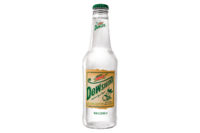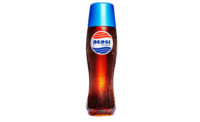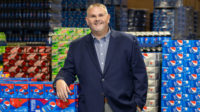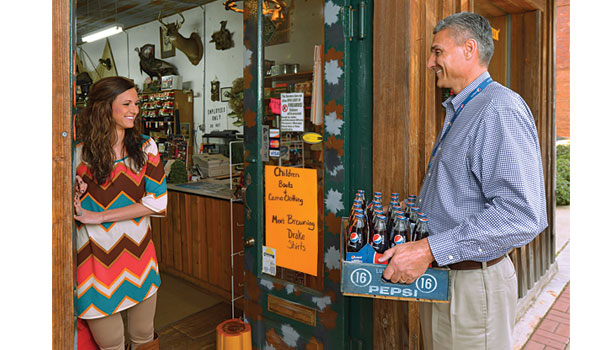2015 Beverage Bottler of the Year: Pepsi-Cola Bottling Co. of Luverne
Pepsi distributor's focus on customer service is key to success


Pepsi-Cola Bottling Co. of Luverne is the 2013 recipient of PepsiCo Americas Beverages’ Donald M. Kendall Bottler of the Year award. (Image by Brent Wallace)


Greg Crouch says the company’s employees are its greatest asset. (Image by Brent Wallace)


Pepsi-Cola Bottling Co. of Luverne’s portfolio includes brands from PepsiCo Inc., Dr Pepper Snapple Group, Wis-Pak Inc. and Community Coffee. (Image courtesy of Brent Wallace)






At a glancePepsi-Cola Bottling Co. of Luverne
> Distribution area: Eight counties in > Distribution warehouse: 1 (Luverne, Ala.) > Cases distributed in 2014: 1.5 million > Employees: 80-85 |
On the drive through Crenshaw County in Alabama, motorists will see a number of small towns, vast woodlands and maybe a few deer. But as drivers pass the handful of restaurants and general stores throughout the county, they might also notice something else: the Pepsi logo.
These retail and foodservice outlets prominently feature the brand logo to signify that they serve Pepsi products. This form of branding is no accident but is part of a marketing strategy that Pepsi-Cola Bottling Co. of Luverne (PCBCL) offers to its customers across the eight counties it services in south-central Alabama to help support their operations.
This commitment to its customers and branding seems to have worked for the Pepsi-licensed distributor, as it has seen its operations increase to 1.5 million cases a year, up from 1.2 million approximately 10 years ago, according to Greg Crouch, chief executive officer and president of PCBCL.
This positive performance also has caught the eye of PepsiCo Americas Beverages (PAB), a division of Purchase, N.Y.-based PepsiCo Inc. PAB named PCBCL a finalist for its Donald M. Kendall Bottler of the Year award in 2010 and 2012 and awarded the company the honor for 2013.
“The 2010 nomination came as a complete surprise [because of] our relative size,” Crouch says. “The subsequent nominations in 2012 and 2013 were an even greater surprise, since we had already been honored as a finalist in 2010.”
Nevertheless, the company’s reception of the award — which recognizes excellence across volume and share growth, per capita consumption, product quality, customer service and community involvement, according to the PepsiCo website — as well as its commitment to its customers and the communities it serves also helped the distributor receive Beverage Industry’s Bottler of the Year recognition.
100 years and beyond
The PCBCL franchise has a rich history within Alabama that spans four generations. Founded in 1915 by John Turner, the bottling company began as a three-man operation that produced 200 cases a day of Lime-Cola, Mil-Kay and NuGrape for Crenshaw County, the company notes. Following John Turner’s death in 1918, his two brothers and son maintained the operations for the next 21 years until 1939 when the three men divided the business interests.
George Turner Sr. retained the bottling business and was joined by his son George Turner Jr. and brother-in-law W.O. Hornsby. The company then secured the Pepsi-Cola franchise and expanded the territory to five complete counties and portions of four others, the company explains. After George Turner Jr. returned from war in 1946, he rejoined his father in the bottling business, and they purchased the Hornsby interest. The father-son combo also invested in new machinery to help increase capacity, and by 1952, the bottler was producing 2,500 cases a day.
George Turner Jr. continued to run the company after his father’s death in 1960 and made a number of moves to increase the company’s reach and production including building a new facility in 1965 and acquiring the Dr Pepper Bottling Co. of Opp in Alabama in 1968. After George Turner Jr.’s death in 1972, his son-in-law Brent Springford assumed management of the company. Among Springford’s investments in the company was the acquisition of the Seven-Up Bottling Co. of Andalusia and joining 12 other bottlers in the formation of the Southeast Canners Inc., a canning co-op in Columbus, Ga. About five years later, the co-op began its bottling operations, and PCBCL’s bottling lines were shut down, the company notes.
The company has since sold its stake in Southeast Canners Inc. and sources its products from other bottling suppliers, including Watertown, Wis.-based Wis-Pak Inc., which has a production facility in Hattiesburg, Miss.
In 2004, Springford and his wife, Charlotte, passed away, and Crouch, who is married to the Springfords’ daughter Robin, joined the family business. Crouch, whose background is in marketing and advertising, notes that at the time he was not as well versed in the bottling industry. To get better acquainted with the bottling industry, Crouch took a hands-on approach by riding route trucks and joining sales calls.
“Day one I went on a route truck, so I started there and did that for probably four months,” he says. “[I would] show up, ride routes and get the feel of how a bottling/distribution franchise worked. I started there, then I moved to the sales guys and rode with them, figured out what they did, and then I got more entrenched in the sales department.”
After taking this hands-on approach to learning about the sales and distribution of the company, Crouch brought on Bobby Brasher, a former Dr Pepper franchise manager, to be general sales manager for PCBCL. “We just had a great relationship, we worked really well together,” Crouch says of Brasher. “He saw how I was running the business and he had the same kind of approach and several years of experience in the beer industry before getting into [Dr Pepper Snapple Group] (DPS), and, thankfully, I convinced him to come onboard and run our sales department.”
This allowed Crouch to channel his expertise from his advertising and marketing days and help PCBCL become more than just a company but a brand too.
Because PCBCL has been part of the Luverne community for 100 years and is one of the largest employers in the town, the company is a strong symbol in the city that bills itself as “The Friendliest City in the South.” A few years ago, Crouch decided to take that symbol to the next level with a redesigned logo. Using a retro influence, the logo features three contoured bottles that are overlaid with the words Pepsi-Cola Bottling Co. Luverne, with the word Luverne as the centerpiece.
This symbol can be found branded on the company’s building headquarters, a storage warehouse, fleet trucks, outdoor billboards and various other materials. Crouch says creating something that was unique to Luverne is an important part of the branding, and his background in marketing and advertising assisted in that. “That’s the approach and how I applied my previous experience creating and developing brands,” he says. “As I look at Pepsi, Dr Pepper and our other franchise companies, [I see] that’s what they are. They have created great products, but they’re relevant because they know how to market. It’s all about branding.”
Consistent approach
Although strong branding will be part of the company’s future, what helped bring it to the level it is at today stems from its strong employee base and the employees’ commitment to their customers.
According to Crouch, 30 percent of the employees have been with PCBCL for more than 10 years, and 15 percent have been with the company for more than 20 years. There are even some who have been around for 30 and even 40 years. When Crouch joined the business 10 years ago, he realized quickly that it is like an extended family there.
“Our employees are our greatest asset,” he says. “We have a tremendous group of experienced, passionate, hardworking people who put service and customer satisfaction first.”
To allow for consistent customer service, PCBCL structured its service areas into three key departments: sales, delivery and merchandising. The company services just more than 1,200 customers, with 900 accounts being foodservice/vending and 300 being retail. Because the company’s territory covers many rural areas in the eight-county makeup, PCBCL employs a channel-specific selling strategy, Crouch says.
“We have dedicated sales teams that service Walmart, grocery/dollar, [convenience and gas] and foodservice/vending,” he explains. “Each team utilizes channel-specific selling strategies to meet company goals and fulfill the needs of each customer.”
For instance, the Walmart, grocery and dollar, and convenience and gas channels are pre-sell routes that feature bulk and/or sideload delivery as well as merchandising services, while the foodservice and vending side of the business remains a conventional sales setup.
But no matter what the sales model is, it all comes back to one key thing: “The culture is built on one key pillar: service,” Brasher says.
Brasher notes that service comes with an extra dedication to the customers by not limiting delivery, case quantities, visits or anything else the customer needs. PCBCL has instilled in the sales team the importance of listening to the customer, identifying his or her needs and meeting them, Brasher says.
Crouch echoes these sentiments, noting that some accounts can receive four visits in a week if that is what is needed for the customer. “We bend over backwards to accommodate what they’re doing,” he says.
PCBCL also has armed its sales staff with iPad Minis to support their daily sales processes. “The iPad Mini is a tremendous selling tool,” Crouch says. “It places up-to-date sales data, promotional calendars, product information and marketing presentations at the fingertips of our frontline sales team.”
When it comes to distribution, PCBCL maintains the same consistent commitment to its customers. To distribute its 326 SKUs, the company’s fleet operations — which is composed of three bulk delivery tractor trailers, six retail route sideloaders, and four vending/foodservice sideloaders — geography also comes into play. Crouch notes that some drivers might travel an hour before they reach their first stop. Because of this vast coverage area, geography must be a consideration, he adds.
“There are four major city centers that we target with a pre-salesman and a delivery representative who follows behind [within] 24 hours, so it’s pre-sold,” Crouch says. “In that same geographical area, we’ll have another full-service vending/foodservice route that focuses on restaurants, schools and other vending accounts.” This is in addition to dedicated large-format account personnel, he adds.
These tactics have proven to be an important part of PCBCL’s consistent approach, which has helped the bottler maintain steady growth since 2004, during a time when many have been challenged with contraction.
“Consistency is a word that I always go back to,” Crouch says. “We haven’t seen one or two record years with double-digit growth. Our sales volume has just been steadily up 2-3 percent year-over-year for the last 10 years, but I would say there was an uptick in 2009.” That was when Crouch brought Brasher on to lead the sales department, allowing him to focus on other ventures. After Brasher joined the team, sales were up in the 3-4 percent range, Crouch adds.
“Our philosophy is not to chase after the big win,” he says. “We focus on maintaining consistent and manageable growth without sacrificing service to our customers.”
Crediting the Mountain Dew brand, Crouch says that the company’s carbonated soft drink (CSD) business is up almost another 3 percent year-to-date. “Dew and other key brand ‘pure play’ initiatives have been and will continue to be our CSD focus going forward,” he adds.
Mountain Dew, Dr Pepper and Pepsi are the best-selling brands in the company’s portfolio throughout all regions and channels; however, PCBCL also has seen growth come from the new 28-ounce Gatorade package. PCBCL added Gatorade to its portfolio approximately four years ago, and its sales are up approximately 30 percent year-to-date. “The conversion from the 32-ounce to the 28-ounce bottle this year has been an overnight success,” Crouch says. “The new package has been a huge hit.”
Partners of PepsiCo also have fared well in the PCBCL territory, including Lipton Peach Iced Tea and Starbucks Frappuccino. “Starbucks Frappuccino is off the charts,” Crouch says. “It’s still a small portion of our business but [shows] triple-digit growth year-over-year.” Crouch notes that the iced coffee trend as well as the brand recognition that Starbucks brings to market have been factors to this success.
The company also distributes a number of brands from Plano, Texas-based DPS’ portfolio including Sunkist, Hawaiian Punch and Canada Dry as well as Klarbrunn Water and Hog Wash from Wis-Pak; Grapico and Sunfresh from Buffalo Rock Co., Birmingham, Ala.; and coffee and tea products from Community Coffee, Baton Rouge, La.
All of these brands have helped PCBCL maintain that growth it has developed these past 10 years.
“With recent industry trends being down year-over-year, there aren’t a lot of bottlers that have maintained continuous growth,” Crouch says. “In the past 10 years we’ve been able to grow our total volume by almost
30 percent We delivered around 1.2 [million cases] in 2004 and we look to finish 2014 above the 1.5 [million]mark. In an industry of declines, we’re that tortoise that keeps on trudging along.”
Although the company has seen its share of successes in the past 10 years, it is not without its own growing pains. “The increased number of SKUs we now sell and service has forced us to re-evaluate every facet of our route to market,” Crouch says. “Our warehouse and trucks are often at capacity during peak seasons. The added number of SKUs and increased points of distribution at retail have also dramatically increased the workload on our sales and merchandising teams.”
Crouch adds that staying on top of the ever-changing beverage landscape is a challenge the company recognizes and has made a priority for its future outlook. “We’re constantly reviewing and revising our portfolio as well as our route to market,” he says. “Our company and our portfolio must be more flexible and diverse than ever before if we are to capture market share in each emerging category.”
In line with its portfolio evaluations, PCBCL will continue to evaluate its procedures and execute those operations and growth models that best align with its customers’ needs. “Pepsi Luverne is primarily interested in improving our processes, but we are aware that the long-term success of the company is dependent on our ability to expand product offerings and our geographical footprint,” Crouch says. “We are constantly looking for expansion opportunities that meet our needs and those of our customers.”
Community first
As PCBCL enters into the 2015 calendar year, it knows it won’t be just any year for the distributor. Marking 100 years in business, Crouch has big plans to celebrate this milestone. Although he still is working out the details, Crouch says the events will be a year-long celebration of its employees, customers and the communities it services.
But anniversary celebrations are not the only way PCBCL maintains its presence in the south-central Alabama area. Community involvement is a key component of the company’s business makeup.
For example, in partnership with the local Kiwanis chapter, PCBCL already has donated $10,000 for the development of a new playground in Luverne and has committed another $10,000 to the project in 2015. The company also contributed to the building of a pavilion in downtown Luverne that serves as a stage for community gatherings and weekend music events.
Greg and Robin Crouch also have utilized their ties to the community to pay homage to the late Brent and Charlotte Springford. The couple developed the Springford Memorial Endowment Scholarship with the University of Alabama. The scholarship awards $8,000 to two full-time undergraduate students majoring in communication studies in the College of Communication and Information Sciences. Priority is given to those who graduated from a high school in south-central Alabama, but it is open to any Alabama high school graduate.
Greg and Robin Crouch also have directed some of their philanthropy to the Dee Turner PTA, which is named after George Turner Jr.’s wife, at Luverne High School. The couple donated $6,000 for the development of the playground, which features American Disability Act-compliant equipment. PepsiCo also was inspired by the couple’s generosity and matched its donation, Crouch says. Crouch adds that Paul Marchand, senior vice president of field human resources of North America Beverages for PepsiCo, personally donated $500, which was later matched by PepsiCo.
With such strong ties to its communities, it’s understandable how PCBCL has become such an important part of “The Friendliest City in the South.”
Looking for a reprint of this article?
From high-res PDFs to custom plaques, order your copy today!












